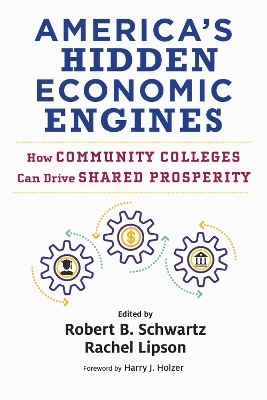
America's Hidden Economic Engines
How Community Colleges Can Drive Shared Prosperity
Seiten
2023
Harvard Educational Publishing Group (Verlag)
978-1-68253-816-6 (ISBN)
Harvard Educational Publishing Group (Verlag)
978-1-68253-816-6 (ISBN)
Spotlights community and technical colleges as institutions uniquely equipped to foster more equitable economic growth across America’s regions. As the book shows, these colleges are the best-placed institutions to reverse the decades-long rise in US economic inequality by race, class, and geography.
Five in-depth case studies reveal the innovative practices that position U.S. community colleges as pathways to quality employment.
In America’s Hidden Economic Engines, editors Robert B. Schwartz and Rachel Lipson spotlight community and technical colleges as institutions uniquely equipped to foster more equitable economic growth across America’s regions. As Schwartz and Lipson show, these colleges are the best-placed institutions to reverse the decades-long rise in US economic inequality by race, class, and geography.
In the book, Harvard Project on Workforce researchers introduce detailed case studies of five institutions—Lorain County Community College in Ohio, Mississippi Gulf Coast Community College, Northern Virginia Community College, Pima Community College in Arizona, and San Jacinto Community College in Texas—that show what is possible when governments, employers, and communities invest in their community colleges’ economic and workforce development mission.
These case studies reveal key institutional policies and practices, leadership behaviors, and organizational structures of successful collaborations between colleges and their regional partners in the public and private sector. Each case underscores how, although community colleges face distinct challenges based on local context, successful schools demonstrate a consistent focus on economic mobility and good jobs across all their programs and activities. In a concluding chapter, the editors champion community colleges as the most critical institutions for the future of US workforce development policy.
Five in-depth case studies reveal the innovative practices that position U.S. community colleges as pathways to quality employment.
In America’s Hidden Economic Engines, editors Robert B. Schwartz and Rachel Lipson spotlight community and technical colleges as institutions uniquely equipped to foster more equitable economic growth across America’s regions. As Schwartz and Lipson show, these colleges are the best-placed institutions to reverse the decades-long rise in US economic inequality by race, class, and geography.
In the book, Harvard Project on Workforce researchers introduce detailed case studies of five institutions—Lorain County Community College in Ohio, Mississippi Gulf Coast Community College, Northern Virginia Community College, Pima Community College in Arizona, and San Jacinto Community College in Texas—that show what is possible when governments, employers, and communities invest in their community colleges’ economic and workforce development mission.
These case studies reveal key institutional policies and practices, leadership behaviors, and organizational structures of successful collaborations between colleges and their regional partners in the public and private sector. Each case underscores how, although community colleges face distinct challenges based on local context, successful schools demonstrate a consistent focus on economic mobility and good jobs across all their programs and activities. In a concluding chapter, the editors champion community colleges as the most critical institutions for the future of US workforce development policy.
Robert B. Schwartz is a professor emeritus of practice in educational policy and administration at the Harvard Graduate School of Education, senior advisor at the Harvard Project on Workforce, and cofounder of the Pathways to Prosperity Network. Rachel Lipson is cofounder of the Project on Workforce at Harvard University and served as its inaugural director.
| Erscheinungsdatum | 10.07.2023 |
|---|---|
| Reihe/Serie | Work and Learning Series |
| Verlagsort | Cambridge |
| Sprache | englisch |
| Maße | 152 x 229 mm |
| Gewicht | 272 g |
| Themenwelt | Sozialwissenschaften ► Pädagogik ► Allgemeines / Lexika |
| Sozialwissenschaften ► Pädagogik ► Bildungstheorie | |
| Sozialwissenschaften ► Pädagogik ► Erwachsenenbildung | |
| ISBN-10 | 1-68253-816-8 / 1682538168 |
| ISBN-13 | 978-1-68253-816-6 / 9781682538166 |
| Zustand | Neuware |
| Informationen gemäß Produktsicherheitsverordnung (GPSR) | |
| Haben Sie eine Frage zum Produkt? |
Mehr entdecken
aus dem Bereich
aus dem Bereich
Einführung in die Theorie transformatorischer Bildungsprozesse
Buch | Softcover (2023)
Kohlhammer (Verlag)
CHF 47,60
Eine Einführung
Buch | Softcover (2023)
Kohlhammer (Verlag)
CHF 49,95


